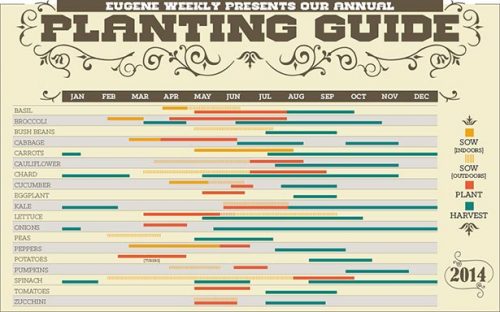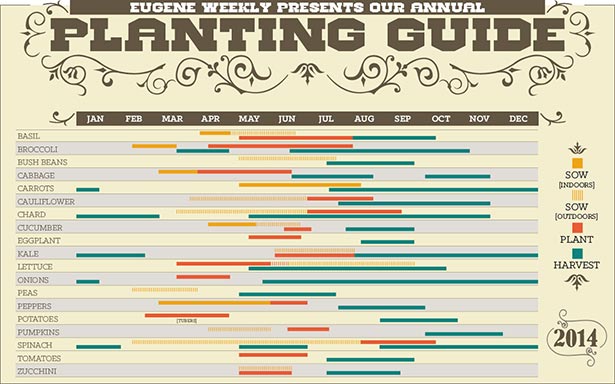
Planning is one of the most important elements of gardening. It is also one of the easiest steps to overlook, especially for the beginner. Knowing a few months ahead of time when you’re going to need to plant and harvest your vegetables can save you serious heartache in the long run. Having your seeds, starts and preservation methods prepped and ready will ensure you the longest growing seasons, the most fruitful crops and the longest lasting life from your produce.
Keeping your eye on the calendar — and another on the weather — can extend the growing season. Many crops can be sown and planted throughout the warmest months — like peas or lettuce — to provide greens much longer than a single planting. Hearty crops — like kale and carrots — can be planted and tended all year ’round.
And while looking to growing, don’t forget to take a moment and look to tending. Having a garden full of nutrient-rich soil, well-planned beds and adequate sunlight/water is just as important as getting your plants in the ground. These steps often carry the gardening experience outside of the growing season and mean investing in a good pair of rubber boots and tilling equipment.
This year we have prepared a yearlong look at some of the most popular crops for our area. This is in no way an exhaustive list, but it will provide beginning and experienced gardeners alike a quick glance at the year and a way to plan out the best garden possible.
SOW: If you are a gardener who likes to start plants from seeds, there will be a time to start those little guys indoors (to protect them from the lingering foul weather). After things start to warm up, it’s all right to put them right in the ground.
PLANT: Whether you are ready to move the plants you have sprouted from seed inside or ready to plant starts you’ve got from your local nursery, now is the time.
HARVEST: Prepare to feast on the fruits (and vegetables) of your labors!
Preparation
September – November
COVER CROPS
Once the harvest season is over and your beds are cleared, it is time to plant cover crops. Legumes like crimson clover give soil a healthy boost of nitrogen while various grasses will give you a good dose of green matter for tilling come spring.
January – February
COMPOST/BUILD BEDS
You’ll need to plan time before the planting season to get your garden ready. Till your cover crop into your soil, compost, map out your garden and build beds. Take into account drainage, bed width (limiting width to 4 feet makes the center easy to reach), companion planting and sunlight.
All growing season
Compost tea
A great way to give growing plants a little boost of nutrients.
